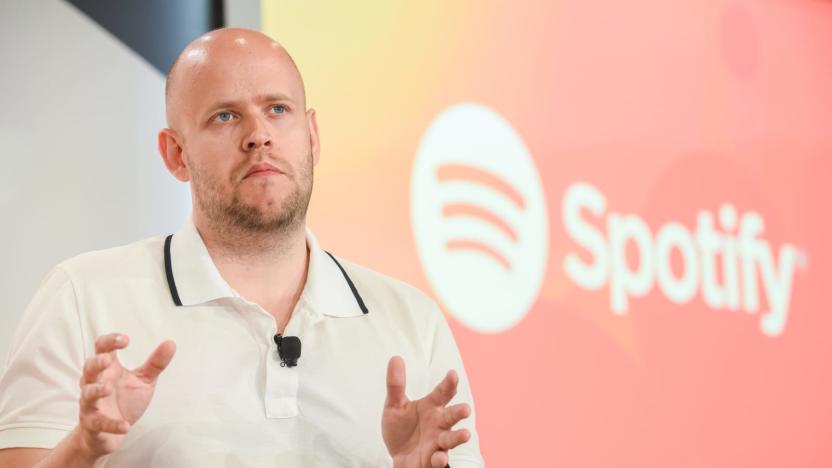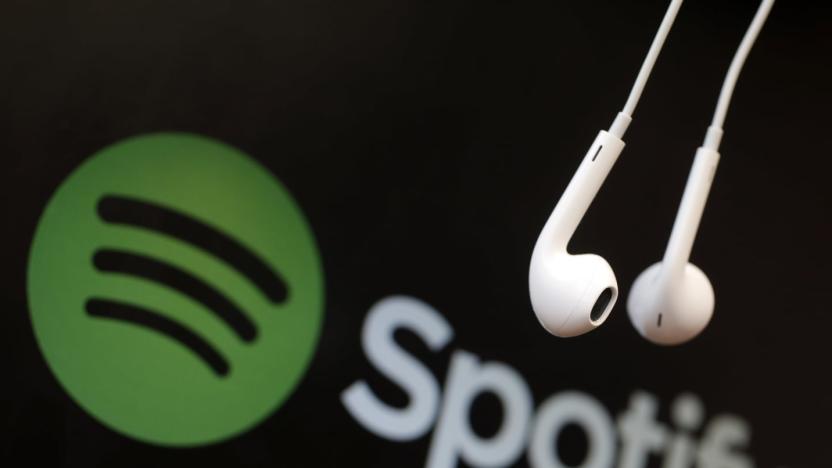licensing
Latest

Spotify might delay album releases for 'free' users
Spotify's deadlock with three of the largest music labels could soon come to an end. According to the Financial Times, the streaming company has agreed to 'window' important album releases to keep them on side. It would mean select records are only available to premium members for a period of time, incentivising subscriptions and boosting the revenue that trickles through to labels. The FT says nothing has been signed just yet, but stress talks have "picked up considerably" since the concession was made.

Apple hits Qualcomm with two more antitrust lawsuits
Just days after hitting Qualcomm with a $1 billion lawsuit, Apple is doubling down with two more antitrust lawsuits against the chipmaker. As Reuters reports Wednesday, the latest pair of suits were filed by Apple's subsidiary in China, alleging Qualcomm "abused its clout" in the industry and that the company never made good on its promise to cheaply license its patents.

Recording industry writes Trump on the eve of tech CEO visit
According to multiple reports, on Wednesday a number of high-profile tech execs will visit President-elect Donald Trump. The list includes Larry Page and Eric Schmidt, Tim Cook, Sheryl Sandberg, Jeff Bezos, Brian Krzanich and a number of others. Before that meeting goes down, however, the "music community" consisting of the Recording Industry Association of America (RIAA) and friends decided this was the time to speak up. In a letter (PDF) to Trump, the industry made its case for how valuable music is, and how that value (for their member companies) is being siphoned away by tech companies that don't do enough to make sure every note is paid for.

Apple loses FaceTime patent retrial, ordered to pay $302.4 million
In the continuing saga of Apple vs. VirnetX, Reuters reports that a federal jury in the Eastern District of Texas has ruled in favor of VirnetX, ordering Apple to pay $302.4 million in damages. This particular case has been going on since 2010, and in the last verdict, a jury ruled Apple owed more than $600 million to the "non-practicing entity (read: patent troll) over technology used in FaceTime. However, in August the appeals court threw that ruling out, saying jurors may have been confused by references to the first iteration of this case.

Pandora's new streaming service could launch as soon as September
We've know about Pandora's plan to turn the remaining pieces of Rdio into its own subscription service for some time now, but thanks to The Wall Street Journal, we know that the launch could be imminent. WSJ reports that the company is close to securing the necessary licensing deals for the new paid service in both the US and abroad. The media outlet's sources indicate that in addition to a free tier, there will also be two paid options -- a detail we've heard the company's CEO discuss in the past. We surmise that listening for free means that you'll have to suffer through some ads, but that's something Pandora will likely confirm at launch.

Apple's idea for music royalties could stick it to Spotify
The Copyright Royalty Board, a three judge panel that sets licensing rates, is trying to figure out what the statutory rate music download and streaming services will pay publishers between 2018 and 2022. Now, the New York Times and Billboard report that Apple has a suggestion on how to figure out those rates that oh-so-coincidentally would negatively impact services with free streaming options like Spotify (heating up their back-and-forth battle) and YouTube. The statutory rate is what services pay unless they make a direct deal with a publisher, and can shape negotiations between them.

Spotify's deal with Dubset means more remixes to stream
Back in March, Apple reached a deal with Dubset to make sure sampled artists in remixes and DJ mixes on its music service were properly compensated. Last week, Spotify did the same, inking an agreement to leverage Dubset's MixBANK distribution platform to ensure that both the artists creating the mixes and those being sampled receive the royalties they're due. The MixBANK system checks an uploaded track for copyrighted material before getting permission for its use from the correct label and/or publisher.

A single European market won't lead to a single European Netflix
Today the European Commission (EC) published a large number of proposals in its ongoing pursuit of a Digital Single Market -- the notion that a person or company in one European nation should be able to buy goods from any person or company in another. Chief among them were new rules regarding geoblocking that would make it easier to access sites from other European countries. But while this might simplify things for a Brit who wants to buy video games in France, for example, it's not likely to make a huge difference when it comes to streaming services, which the EC has identified as one of the areas "most affected by geoblocking."

SoundCloud inks deal with Sony Music as streaming service looms
Back in January, SoundCloud and Universal Music Group came to terms on a licensing deal and now the popular music site has inked another agreement. SoundCloud announced today that it has a deal in place with Sony Music Entertainment, which means that the company now has agreements will all three major labels. In late 2014, the audio repository revealed its licensing deal with Warner Music Group and added 20,000 indie labels last summer after hashing out royalty terms with Merlin.

Apple Music gets previously unlicensed remixes thanks to Dubset
When it comes to remixes and mashups, music licensing deals and royalties become tricky business. Thanks to a new deal with Dubset, though, Apple Music will gain an entire collection of the tunes. Dubset's MixBANK distribution platform ensures that both artists being sampled and the DJs creating the mixes get their share of the royalties. The company does this by using MixBANK to identify any copyrighted music in a remix and clearing its use with the proper labels and publishers.

SoundCloud and Universal finally agree on licensing deal
It took a while to complete, but SoundCloud and Universal Music Group have a licensing agreement in place. Back in 2014, reports surfaced that the music hosting site was working on deals with both Universal and Warner Music, and the company inked an agreement with the latter in the months that followed. SoundCloud also reached a deal with Merlin last year, a company that represents 20,000 indie labels on matters of royalties and licensing. With its latest agreement, SoundCloud secures access to Universal Music's massive roster of artists which includes the Weeknd, Sam Smith and U2.

Spotify pledges to fix the music industry's royalty problems
Paying artists for streams isn't just Spotify's problem -- the whole industry is stuck with a royalty model that's better suited for physical sales than streaming. Spotify is the one that's pledging to fix that, though. In a recent blog post the company dives into the complexity of licensing systems, noting that different publishers own the rights to the same tracks in different countries.

Pandora ends its war with two major music publishers
If there's one thing that Pandora likes, it's a fight, but even the firm that bought an FM radio station to stick it to the man has limits. The outfit has decided to make peace with two of its most formidable adversaries: music licensing agencies ASCAP and BMI. Pandora has revealed that it's signed a new, multi-year deal with both entities that'll see it pay what'll probably be a higher fee every time one of their songs is played. Naturally, the terms of the agreements are being kept secret, but USA Today thinks that it'll be above the 2.5 / 1.75 percent that BMI and ASCAP, respectively, currently earn.

Video license deal protects the future of 4K
The future of 4K video has been in doubt as of late. You see, the HEVC Advance group that's licensing the H.265/HEVC video format (crucial to stuffing 4K into modern data pipes) wanted steep royalties seemingly everywhere, with no cap -- even free services faced a small outlay. It was so pricey that tech giants started work on their own royalty-free format to avoid being on the hook. At last, though, HEVC Advance has seen the light: it's offering a revamped licensing scheme. While it could still be costly for some, it's inexpensive enough that it might safeguard the future of 4K content.

Bloomberg: Swatch is hoarding smartwatch patents
We've snarked at Swatch for waiting forever to release a smartwatch, only for the finished article to be a regular watch with an NFC chip beneath the dial. Bloomberg Business believes that the Swiss firm is playing the long game by quietly hoarding a pile of (173) patents related to the technology. The news agency has dug deep into the paperwork to learn that Swatch holds rights to plenty of useful concepts including proximity sensors and data-transmitting batteries. Sources claim that the watchmaker has enough IP in its back pocket to make a device on its own, unlike TAG Heuer, which had to partner with Intel.

Microsoft persuades ASUS to install Office on its Android phones
ASUS will install Office apps and other "innovative product solutions" from Microsoft on its Android phones thanks to a new patent licensing deal. The arrangement builds on an existing, private deal over Android phones between the two companies, according to ZDNet. Despite holding most of the patent cards, Microsoft magnanimously said the pact "opens the door to the kind of collaboration between Microsoft and ASUS made possible only through mutual respect and alignment on intellectual property." ASUS joins Samsung, LG, Sony and 20 or so other manufacturers that signed deals with Microsoft to bundle Office apps on Android devices.

Nintendo is once again open to movies based on its games
Nintendo has lately been willing to license its characters for movies (see Donkey Kong's appearance in Pixels), but it's been a long time since there was a flick based on its characters -- maybe it's still having traumatic flashbacks to Super Mario Bros. from 1993. Whatever the reasons, it might just have a change of heart. Shigeru Miyamoto tells Fortune that the firm is thinking "more and more" about including movies as part of its strategy. He used to see movies as passive content that was at odds with gaming, but a shift to treating Nintendo as an "entertainment company" has once again raised the prospects of movie adaptations.

2K is reportedly bringing college basketball back to its games
For the first time in years, college basketball teams may soon be playable in a video game. ESPN's Darren Rovell reports that 2K Sports has licensing deals in place with ten schools and plans to include them in an upcoming title. That list of teams includes Arizona, Kansas, Louisville, Michigan, UCLA and more according to SB Nation -- some of college basketball's big-name programs. If you'll recall, EA cancelled the 2014 installment of its college football title after a lawsuit over the use of player likenesses and the NCAA pulling its licensing deal. When it comes to college hoops, though, there hasn't been a game in several years, so this would be a welcome release for folks who've been waiting.

SiriusXM will pay $210 million to use songs recorded before 1972
Before now, satellite radio company SiriusXM wasn't paying royalties on the catalog recorded before 1972 that it beamed to customers. Today, the company agreed to pay $210 million for those songs, compensating both independent and major record labels for using their material. The settlement comes after ABKCO Music & Records, Capitol Records, Sony Music Entertainment, UMG Recordings and Warner Music Group filed a lawsuit against SiriusXM in 2013. Under the terms of the agreement, the satellite radio service can "to reproduce, perform and broadcast" the library of tunes until December 31, 2017 without further payments. This means that tracks from the likes of the Rolling Stones, Gloria Gaynor and many more will be subject to agreements. Why weren't they protected before? Material recorded prior to February 15, 1972 isn't subject to the same protections as songs released after, so streaming services and radio stations weren't required to pay licensing fees.

Nokia CEO says the company will design and license phones again
When a deal with Microsoft allows it to do so in 2016, Nokia plans to design and license phones again. In what comes as no surprise, the company's CEO told Manager Magazin that it would look for interested parties to release the devices when the time comes. "We will look for suitable partners," said CEO Rajeev Suri in an interview. "We would simply design them and then make the brand name available to license." Nokia sold its devices and services business to Microsoft last year, but it can begin to license mobile gadgets to other companies next year. If you'll recall, it already released the familiar-looking N1 tablet in China post-acquisition. Of course, Nokia still owns its Here mapping tech, which has reportedly drawn interest from automakers and transportation companies like Uber. While the devices may carry Nokia's aesthetics, keep in mind that the Lumia, Asha and X brands all belong to Microsoft. A company would pay Nokia for the design work and rights to use the name, but those recognizable labels are off limits. [Image credit: Stilgherrian/Flickr]






